At the heart of Frontier Nursing University is a talented and diverse community of students, alumni, faculty, staff, couriers and preceptors. Spotlight blogs feature members of our FNU community who are focused on the mission of educating nurse-midwives and nurse practitioners to deliver quality healthcare to underserved and rural populations.
 Dr. Lourdes Prince has been a champion of DEI throughout her career in healthcare and education. This summer, Dr. Prince became a Diversity, Equity and Inclusion Faculty Fellow at FNU and served as a moderator during the Diversity Impact conference in July. She is also a reviewer for the Nursing Workforce Diversity grant scholarship and a member of the Diversity, Equity, Inclusion and Belonging; the Diversity Impact Planning; and the Culture of Caring committees at FNU.
Dr. Lourdes Prince has been a champion of DEI throughout her career in healthcare and education. This summer, Dr. Prince became a Diversity, Equity and Inclusion Faculty Fellow at FNU and served as a moderator during the Diversity Impact conference in July. She is also a reviewer for the Nursing Workforce Diversity grant scholarship and a member of the Diversity, Equity, Inclusion and Belonging; the Diversity Impact Planning; and the Culture of Caring committees at FNU.
As a Hispanic healthcare professional with extensive experience in DEI, Dr. Prince said an emphasis on DEI is crucial in advancing health in Hispanic communities. She said lack of access, lower socioeconomic status and language barriers often prevent many members of the Hispanic community from seeking care.
“Not only are services often out of reach for these families due to lack of insurance or proximity to these services, but they are often not culturally and linguistically tailored for this population,” she said. “Providers who share the same cultural background as their patients communicate more effectively. When a provider speaks the same language, health concerns are more likely to be heard and addressed in an adequate manner.”

According to the 2020 Census, Hispanics represent 18.7% of the U.S. population, yet only 7.4% of registered nurses, 5% of nurse practitioners, 4.8% of certified nurse-midwives, and 6.5% of physicians are Hispanic. Although access to interpreters is required through the Culturally and Linguistically Appropriate Services (CLAS) standards, Hispanic patients with limited English proficiency often have to rely on family, friends, or other untrained individuals as interpreters.

Over her 24-year career as a Certified Nurse-Midwife, Dr. Lourdes Prince estimates she has delivered more than 4,000 babies.
Addressing disparities in healthcare among the Hispanic population is particularly important when it comes to midwifery care, Dr. Prince said. She said this is highlighted by the fact that the Hispanic community in the U.S. faces significant health disparities, particularly with higher rates of conditions such as obesity, diabetes, hypertension, and chronic liver disease, which can lead to pregnancy complications. Hispanic mothers also are at a greater risk of dying from infection and hemorrhage compared to other racial groups. Midwives, as licensed healthcare providers, play a crucial role in improving maternal care, leading to better outcomes and patient satisfaction.
Dr. Prince said advancing health in the Hispanic community can be supported by increasing the number of Hispanic providers who will become a part of those communities, noting that Hispanic providers can bring a more holistic understanding of their patient’s cultural history and the events that shape their healthcare experience. They can use this understanding to foster respect and better communication with their patients. In regards to maternal care, she said schools of nursing can help address health disparities by recruiting and retaining more Hispanic midwives who will understand their communities’ unique health needs.
“A diverse workforce understands that the language, culture, issues and needs of local patient populations can provide deeper insight that results in better decision-making about how to serve those communities,” she said. “Those decisions then have the potential to positively impact patient experience, safety and quality, and the communities’ overall health.”

To that end, Dr. Prince will address the empowerment of Hispanic nurses and the path to becoming a Nurse-Midwife during a presentation for the National Association of Hispanic Nurses in October. The presentation is a collaborative effort with Dr. Tanya Belcheff, FNU’s Director of Diversity, Equity and Inclusion.
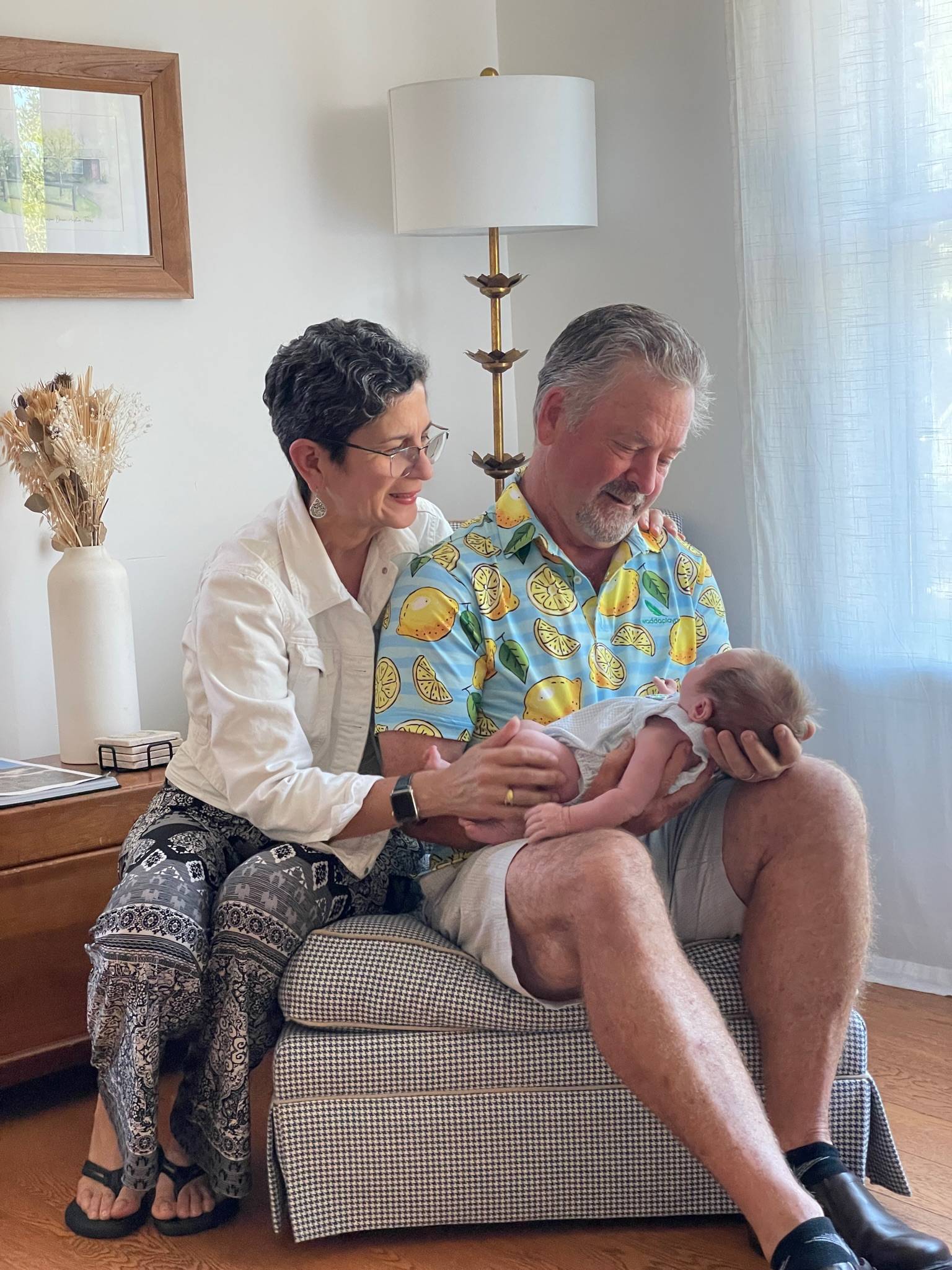
Dr. Lourdes Prince with her husband, Tom, and their third grandchild.
Along with her work in DEI, Dr. Prince also serves as a Regional Clinical Faculty (RCF) member. In this role, she supports Frontier students throughout their clinical journey. She advises, supports, educates, and evaluates students, meeting with them biweekly—or more frequently if needed—to guide them through course expectations and foster a positive learning environment. Dr. Prince also collaborates closely with preceptors to ensure students receive the best clinical experiences.
Before joining FNU, Dr. Prince built a career in midwifery and women’s health. She said her passion for midwifery is rooted in her family history, particularly the legacy of her great-great-grandmother, Monserrate Arroyo, a midwife and healer in Puerto Rico. Inspired by her ancestor’s dedication to caring for her community, Dr. Prince pursued midwifery to provide continuity of care to women throughout various stages of life—a cornerstone of the midwifery model that resonated deeply with her family values.
Dr. Prince worked as a labor and delivery nurse for 12 years before earning a Master of Science in nursing in 1998 and a Doctor of Nursing Practice in 2012 from the University of Florida. Over her 24-year career as a Certified Nurse-Midwife, she estimates she has delivered more than 4,000 babies.
“Earning a DNP demonstrates a commitment to learning at the highest level of nursing practice,” she said. “It expanded my knowledge base and professional capacity. With my DNP, my role as a certified nurse-midwife evolved and overlapped with the other area that sparked my passion: nursing education.”

Dr. Lourdes Prince in her home office with her dog, Lola.
After working as a labor and delivery nurse, Dr. Prince worked in a full scope private practice for four years before joining an OB-GYN Faculty practice with Orlando Health. At Orlando Health, Dr. Prince participated in the Perinatal Improvement Collaborative, testing interventions and protocols to reduce preventable deaths and complications among mothers and babies. She also supervised first-year OB-GYN residents with normal labor and birth.
Dr. Prince also helped launch the collaborative practice between Maternal Fetal Medicine and Certified Nurse-Midwives at Winnie Palmer Hospital in Orlando. Precepting graduate nursing students since 1999, Dr. Prince has been committed to improving healthcare by clinically preparing OB-GYN residents, nurse practitioners and nurse-midwives to serve their communities. This extensive experience in precepting led her to her career at FNU, she said.
“I had colleagues who were RCFs with FNU, and they felt that with my many years of work and precepting experience, I would be a good fit at FNU,” she said. “My passion for precepting students evolved into joining FNU as an RCF.”
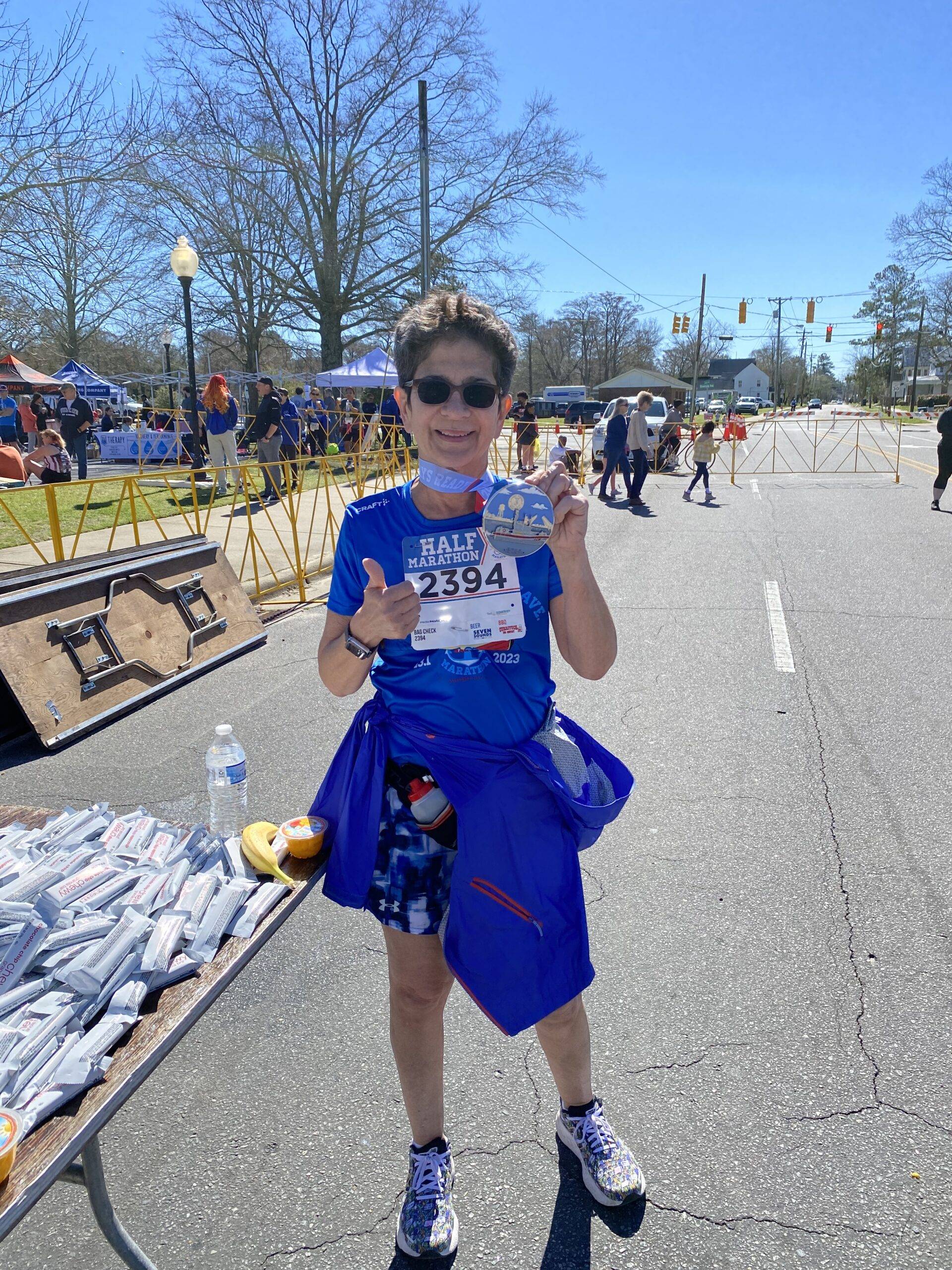
Dr. Lourdes Prince after completing a half marathon.
Thank you, Lourdes, for your dedication to midwifery education, the Hispanic community and promoting diversity, equity and inclusion in healthcare. Frontier is fortunate to have such an inspiring and passionate leader as part of our faculty.
Learn more about advanced nursing degrees and specialties at Frontier Nursing University. Subscribe to our blog for the latest news and events at FNU and to get inspired with stories featuring our alumni, students, faculty, preceptors and staff!
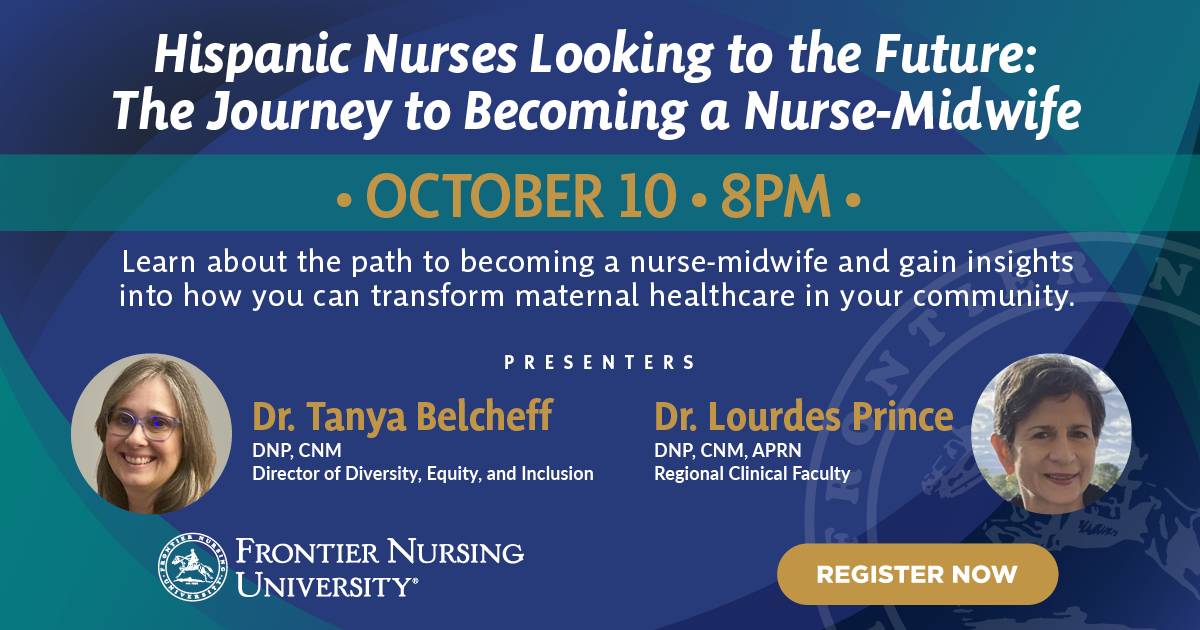
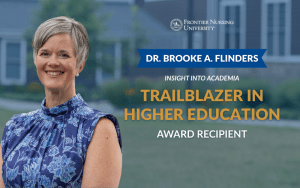

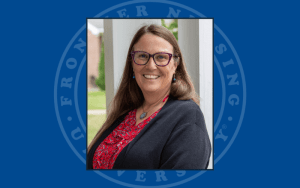



















 Carrie Belin is an experienced board-certified Family Nurse Practitioner and a graduate of the Johns Hopkins DNP program, Johns Hopkins Bloomberg School of Public Health, Georgetown University School of Nursing, and Johns Hopkins School of Nursing. She has also completed fellowships at Georgetown and the University of California Irvine.
Carrie Belin is an experienced board-certified Family Nurse Practitioner and a graduate of the Johns Hopkins DNP program, Johns Hopkins Bloomberg School of Public Health, Georgetown University School of Nursing, and Johns Hopkins School of Nursing. She has also completed fellowships at Georgetown and the University of California Irvine. Angie has been a full-scope midwife since 2009. She has experience in various birth settings including home, hospital, and birth centers. She is committed to integrating the midwifery model of care in the US. She completed her master’s degree in nurse-midwifery at Frontier Nursing University (FNU) and her Doctorate at Johns Hopkins University. She currently serves as the midwifery clinical faculty at FNU. Angie is motivated by the desire to improve the quality of healthcare and has led quality improvement projects on skin-to-skin implementation, labor induction, and improving transfer of care practices between hospital and community midwives. In 2017, she created a short film on skin-to-skin called
Angie has been a full-scope midwife since 2009. She has experience in various birth settings including home, hospital, and birth centers. She is committed to integrating the midwifery model of care in the US. She completed her master’s degree in nurse-midwifery at Frontier Nursing University (FNU) and her Doctorate at Johns Hopkins University. She currently serves as the midwifery clinical faculty at FNU. Angie is motivated by the desire to improve the quality of healthcare and has led quality improvement projects on skin-to-skin implementation, labor induction, and improving transfer of care practices between hospital and community midwives. In 2017, she created a short film on skin-to-skin called 










 Justin C. Daily, BSN, RN, has ten years of experience in nursing. At the start of his nursing career, Justin worked as a floor nurse on the oncology floor at St. Francis. He then spent two years as the Director of Nursing in a small rural Kansas hospital before returning to St. Francis and the oncology unit. He has been in his current position as the Chemo Nurse Educator for the past four years. He earned an Associate in Nurse from Hutchinson Community College and a Bachelor of Science in Nursing from Bethel College.
Justin C. Daily, BSN, RN, has ten years of experience in nursing. At the start of his nursing career, Justin worked as a floor nurse on the oncology floor at St. Francis. He then spent two years as the Director of Nursing in a small rural Kansas hospital before returning to St. Francis and the oncology unit. He has been in his current position as the Chemo Nurse Educator for the past four years. He earned an Associate in Nurse from Hutchinson Community College and a Bachelor of Science in Nursing from Bethel College. Brandy Jackson serves as the Director of Undergraduate Nursing Programs and Assistant Educator at Wichita State University and Co-Director of Access in Nursing. Brandy is a seasoned educator with over 15 years of experience. Before entering academia, Brandy served in Hospital-based leadership and Critical Care Staff nurse roles. Brandy is passionate about equity in nursing education with a focus on individuals with disabilities. Her current research interests include accommodations of nursing students with disabilities in clinical learning environments and breaking down barriers for historically unrepresented individuals to enter the nursing profession. Brandy is also actively engaged in Interprofessional Education development, creating IPE opportunities for faculty and students at Wichita State. Brandy is an active member of Wichita Women for Good and Soroptimist, with the goal to empower women and girls. Brandy is a TeamSTEPPS master trainer. She received the DASIY Award for Extraordinary Nursing Faculty in 2019 at Wichita State University.
Brandy Jackson serves as the Director of Undergraduate Nursing Programs and Assistant Educator at Wichita State University and Co-Director of Access in Nursing. Brandy is a seasoned educator with over 15 years of experience. Before entering academia, Brandy served in Hospital-based leadership and Critical Care Staff nurse roles. Brandy is passionate about equity in nursing education with a focus on individuals with disabilities. Her current research interests include accommodations of nursing students with disabilities in clinical learning environments and breaking down barriers for historically unrepresented individuals to enter the nursing profession. Brandy is also actively engaged in Interprofessional Education development, creating IPE opportunities for faculty and students at Wichita State. Brandy is an active member of Wichita Women for Good and Soroptimist, with the goal to empower women and girls. Brandy is a TeamSTEPPS master trainer. She received the DASIY Award for Extraordinary Nursing Faculty in 2019 at Wichita State University.  Dr. Sabrina Ali Jamal-Eddine is an Arab-disabled queer woman of color with a PhD in Nursing and an interdisciplinary certificate in Disability Ethics from the University of Illinois Chicago (UIC). Dr. Jamal-Eddine’s doctoral research explored spoken word poetry as a form of critical narrative pedagogy to educate nursing students about disability, ableism, and disability justice. Dr. Jamal-Eddine now serves as a Postdoctoral Research Associate in UIC’s Department of Disability and Human Development and serves on the Board of Directors of the National Organization of Nurses with Disabilities (NOND). During her doctoral program, Sabrina served as a Summer Fellow at a residential National Endowment of the Humanities (NEH) Summer Institute at Arizona State University (2023), a summer fellow at Andrew W. Mellon’s National Humanities Without Walls program at University of Michigan (2022), a Summer Research Fellow at UC Berkeley’s Othering & Belonging Institute (2021), and an Illinois Leadership Education in Neurodevelopmental and related Disabilities (LEND) trainee (2019-2020).
Dr. Sabrina Ali Jamal-Eddine is an Arab-disabled queer woman of color with a PhD in Nursing and an interdisciplinary certificate in Disability Ethics from the University of Illinois Chicago (UIC). Dr. Jamal-Eddine’s doctoral research explored spoken word poetry as a form of critical narrative pedagogy to educate nursing students about disability, ableism, and disability justice. Dr. Jamal-Eddine now serves as a Postdoctoral Research Associate in UIC’s Department of Disability and Human Development and serves on the Board of Directors of the National Organization of Nurses with Disabilities (NOND). During her doctoral program, Sabrina served as a Summer Fellow at a residential National Endowment of the Humanities (NEH) Summer Institute at Arizona State University (2023), a summer fellow at Andrew W. Mellon’s National Humanities Without Walls program at University of Michigan (2022), a Summer Research Fellow at UC Berkeley’s Othering & Belonging Institute (2021), and an Illinois Leadership Education in Neurodevelopmental and related Disabilities (LEND) trainee (2019-2020). Vanessa Cameron works for Vanderbilt University Medical Center in Nursing Education & Professional Development. She is also attending George Washington University and progressing towards a PhD in Nursing with an emphasis on ableism in nursing. After becoming disabled in April 2021, Vanessa’s worldview and perspective changed, and a recognition of the ableism present within healthcare and within the culture of nursing was apparent. She has been working since that time to provide educational foundations for nurses about disability and ableism, provide support for fellow disabled nursing colleagues, and advocate for the disabled community within healthcare settings to reduce disparities.
Vanessa Cameron works for Vanderbilt University Medical Center in Nursing Education & Professional Development. She is also attending George Washington University and progressing towards a PhD in Nursing with an emphasis on ableism in nursing. After becoming disabled in April 2021, Vanessa’s worldview and perspective changed, and a recognition of the ableism present within healthcare and within the culture of nursing was apparent. She has been working since that time to provide educational foundations for nurses about disability and ableism, provide support for fellow disabled nursing colleagues, and advocate for the disabled community within healthcare settings to reduce disparities. Dr. Lucinda Canty is a certified nurse-midwife, Associate Professor of Nursing, and Director of the Seedworks Health Equity in Nursing Program at the University of Massachusetts Amherst. She earned a bachelor’s degree in nursing from Columbia University, a master’s degree from Yale University, specializing in nurse-midwifery, and a PhD from the University of Connecticut. Dr. Canty has provided reproductive health care for over 29 years. Her research interests include the prevention of maternal mortality and severe maternal morbidity, reducing racial and ethnic health disparities in reproductive health, promoting diversity in nursing, and eliminating racism in nursing and midwifery.
Dr. Lucinda Canty is a certified nurse-midwife, Associate Professor of Nursing, and Director of the Seedworks Health Equity in Nursing Program at the University of Massachusetts Amherst. She earned a bachelor’s degree in nursing from Columbia University, a master’s degree from Yale University, specializing in nurse-midwifery, and a PhD from the University of Connecticut. Dr. Canty has provided reproductive health care for over 29 years. Her research interests include the prevention of maternal mortality and severe maternal morbidity, reducing racial and ethnic health disparities in reproductive health, promoting diversity in nursing, and eliminating racism in nursing and midwifery. Dr. Lisa Meeks is a distinguished scholar and leader whose unwavering commitment to inclusivity and excellence has significantly influenced the landscape of health professions education and accessibility. She is the founder and executive director of the DocsWithDisabilities Initiative and holds appointments as an Associate Professor in the Departments of Learning Health Sciences and Family Medicine at the University of Michigan.
Dr. Lisa Meeks is a distinguished scholar and leader whose unwavering commitment to inclusivity and excellence has significantly influenced the landscape of health professions education and accessibility. She is the founder and executive director of the DocsWithDisabilities Initiative and holds appointments as an Associate Professor in the Departments of Learning Health Sciences and Family Medicine at the University of Michigan. Dr. Nikia Grayson, DNP, MSN, MPH, MA, CNM, FNP-C, FACNM (she/her) is a trailblazing force in reproductive justice, blending her expertise as a public health activist, anthropologist, and family nurse-midwife to champion the rights and health of underserved communities. Graduating with distinction from Howard University, Nikia holds a bachelor’s degree in communications and a master’s degree in public health. Her academic journey also led her to the University of Memphis, where she earned a master’s in medical anthropology, and the University of Tennessee, where she achieved both a master’s in nursing and a doctorate in nursing practice. Complementing her extensive education, she completed a post-master’s certificate in midwifery at Frontier Nursing University.
Dr. Nikia Grayson, DNP, MSN, MPH, MA, CNM, FNP-C, FACNM (she/her) is a trailblazing force in reproductive justice, blending her expertise as a public health activist, anthropologist, and family nurse-midwife to champion the rights and health of underserved communities. Graduating with distinction from Howard University, Nikia holds a bachelor’s degree in communications and a master’s degree in public health. Her academic journey also led her to the University of Memphis, where she earned a master’s in medical anthropology, and the University of Tennessee, where she achieved both a master’s in nursing and a doctorate in nursing practice. Complementing her extensive education, she completed a post-master’s certificate in midwifery at Frontier Nursing University.









 Dr. Tia Brown McNair is the Vice President in the Office of Diversity, Equity, and Student Success and Executive Director for the Truth, Racial Healing, and Transformation (TRHT) Campus Centers at the American Association of Colleges and Universities (AAC&U) in Washington, DC. She oversees both funded projects and AAC&U’s continuing programs on equity, inclusive excellence, high-impact practices, and student success. McNair directs AAC&U’s Summer Institutes on High-Impact Practices and Student Success, and TRHT Campus Centers and serves as the project director for several AAC&U initiatives, including the development of a TRHT-focused campus climate toolkit. She is the lead author of From Equity Talk to Equity Walk: Expanding Practitioner Knowledge for Racial Justice in Higher Education (January 2020) and Becoming a Student-Ready College: A New Culture of Leadership for Student Success (July 2016 and August 2022 Second edition).
Dr. Tia Brown McNair is the Vice President in the Office of Diversity, Equity, and Student Success and Executive Director for the Truth, Racial Healing, and Transformation (TRHT) Campus Centers at the American Association of Colleges and Universities (AAC&U) in Washington, DC. She oversees both funded projects and AAC&U’s continuing programs on equity, inclusive excellence, high-impact practices, and student success. McNair directs AAC&U’s Summer Institutes on High-Impact Practices and Student Success, and TRHT Campus Centers and serves as the project director for several AAC&U initiatives, including the development of a TRHT-focused campus climate toolkit. She is the lead author of From Equity Talk to Equity Walk: Expanding Practitioner Knowledge for Racial Justice in Higher Education (January 2020) and Becoming a Student-Ready College: A New Culture of Leadership for Student Success (July 2016 and August 2022 Second edition).